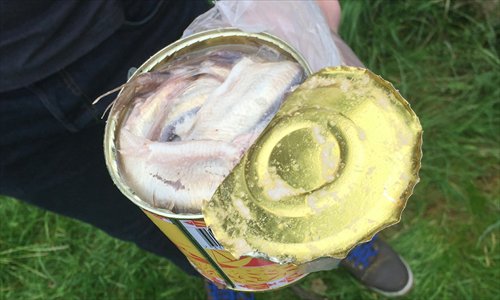Chinese outdo their Western counterparts in global fermented Baltic Sea herring challenge

Zheng Bowen (right) opens a can of fermented Baltic Sea herring in Hyde Park in London with his friends. Photo: Courtesy of Zheng Bowen

A can of fermented Baltic Sea herring Photo: Courtesy of Zheng Bowen
Zheng Bowen, a 21-year-old international student at Imperial College in London, squatted and slowly approached a little can. He wore gloves as if there was something sinister inside. Behind him, a group of his Chinese friends cheered him on.
He steadied himself and opened the can. Just as he did so, a big gust of wind threw some of its contents onto his shirt unleashing a foul smell. The stench was everywhere.
Zheng is one of an increasing number of Chinese who are participating in a stinky food competition called the Surströmming challenge.
The challenge is simple: try to eat Surströmming without vomiting.
Surströmming, fermented Baltic Sea herring, is a traditional Swedish dish and is famous for its strong smell. As videos of people vomiting after taking the challenge go viral online, many Chinese people are also excitedly participating in the global trend.
So far, they seem to be up to the challenge. While Zheng conceded that the smell was "disgusting," he said it was bearable, and after waiting for some of the smell to dissipate, he ate it. "Some of my friends said it's like the smell of Chinese pickled cabbage, but I think it's much more stinky than that," said Zheng. "But the taste was not that bad, much better than the smell, just like raw fish, very salty and a little sour."
"Generally, Chinese people are more tolerant of stinky food," said Fa Ye (pseudonym), 27, a director of Brave Gourmet, a Sina Weibo blog that aims to try every kind of food on earth as long as it is edible.
"In weird food, if stinkiness is the standard, most Chinese can absolutely handle it because, in China, there are more terrible ones," Fa said.
Besides the popular stinky tofu, Fa said there are Chinese dishes that pack an even smellier punch, such as those that use rukkola, a stinky vegetable which is mixed with leguminous plants and mold.
Rukkola is popular in Zhejiang Province and can be cooked with tomato, fish and eggs.
Pickled crab is another smelly example, Fa said. It is a specialty in Guangxi Zhuang Autonomous Region. Live crabs are caught, cleaned, put into a container with salt, garlic, and wine, and dried in the sun. It gets its pungent smell from fermentation as there is no heating or cooking involved in the process. Locals love it because the scent lingers and helps to stimulate their appetite.
As for Surströmming, Fa said there is a special way to enjoy it.
"Pour the liquid out of the can and remove the fish bones. Cover a prepared pancake with butter and then mash the fish and put it onto the pancake with diced sweet potatoes and onions. Cheese and tomato could also be added," he said.
Zheng and his friends ate the fish with Coca-Cola. He said they did not waste even a single bite as they took turns eating it and finished the whole can. However, after their "stinky entertainment," they had to walk home.
"We dared not go home by bus because of the smell lingered around us," he said. "It took more than two hours for the smell to dissipate.
Fa said most Chinese people try Surströmming for entertainment. "Entertainment is okay, but people need to respect food. Just remember that there is a correct way of eating and meaning for every kind of food."
Newspaper headline: Surströmming anyone?